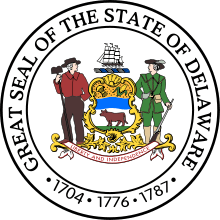List of Governors of Delaware
| Governor of Delaware | |
|---|---|
|
| |
| Style | The Honorable |
| Residence |
Delaware Governor's Mansion Dover, Delaware |
| Term length | Four years, renewable once |
| Inaugural holder | John McKinly |
| Formation | February 12, 1777 |
| Deputy | Vacant |
| Salary | $171,000 (2013)[1] |
| Website | governor.delaware.gov |
The Governor of Delaware (President of Delaware from 1776 to 1792) is the head of the executive branch of Delaware's state government and the commander-in-chief of the state's military forces. The governor has a duty to enforce state laws, and the power to either approve or veto bills passed by the Delaware Legislature, to convene the legislature,[2] and to grant pardons, except in cases of impeachment, and only with the recommendation of the Board of Pardons.[3]
There have been 70 people who have served as governor, over 73 distinct terms. Additionally, Henry Molleston was elected, but died before he could take office. Only four governors have been elected to two consecutive terms, with the longest-serving being Ruth Ann Minner, who was elected twice after succeeding to the office, serving a total of just over eight years. The shortest term is that of Dale E. Wolf, who served 18 days following his predecessor's resignation; David P. Buckson served 19 days under similar circumstances. The current governor is Jack Markell, who took office on January 20, 2009; his second term expires on January 17, 2017, when the governor-elect, John Carney, will take office.
Governors
- For the period before independence, see the List of colonial governors of Pennsylvania.
Between 1681 and 1776, Delaware was a colony of the Kingdom of Great Britain, administered by colonial governors in Pennsylvania as the "Lower Counties on Delaware".
In 1776, soon after Delaware and the other Thirteen Colonies declared independence from Britain, the state adopted its first state constitution. It created the office of President of Delaware, a chief executive to be chosen by the legislature to serve a term of three years.[4]
The office of President was renamed Governor by the constitution of 1792,[5] which set the commencement date of the term to the third Tuesday in the January following an election, and limited governors to serving only three out of any six years.[6] The term was lengthened to four years by the 1831 constitution, but governors were limited to a single term.[7] The current constitution of 1897 allows governors to serve two terms.[8]
The 1776 constitution stated that if the presidency were vacant, the speaker of the legislative council would be a vice-president.[9] The 1792 constitution has the speaker of the senate exercising the office when it is vacant, and the 1897 constitution created the office of lieutenant governor,[10] upon whom the office devolves in case of vacancy.[11] The offices of governor and lieutenant governor are elected at the same time but not on the same ticket.
- Parties
American (1) Democratic (21)[lower-alpha 1] Democratic-Republican (5)[lower-alpha 1] Federalist (13)[lower-alpha 2] National Republican (1) No party (9) Republican (17) Whig (6)[lower-alpha 1]
| #[lower-alpha 3] | Portrait | Governor[lower-alpha 4] | Term in office | Party | Term[lower-alpha 5] | Lt. Governor[lower-alpha 6][lower-alpha 7] | ||
|---|---|---|---|---|---|---|---|---|
| 1 |  |
John McKinly | February 12, 1777 – September 12, 1777 |
No parties | 1 (1777) [lower-alpha 8] |
Office did not exist | ||
| — | — | Interregnum | September 12, 1777 – September 22, 1777 | |||||
| 2 |  |
Thomas McKean | September 22, 1777 – October 20, 1777 | |||||
| 3 |  |
George Read | October 20, 1777 – March 31, 1778 | |||||
| 4 | 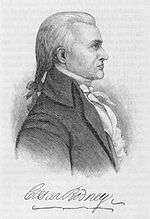 |
Caesar Rodney | March 31, 1778 – November 6, 1781 |
2 (1778) | ||||
| 5 | 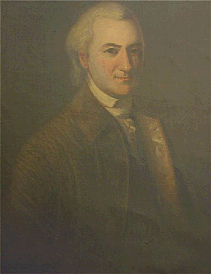 |
John Dickinson | November 13, 1781 – January 12, 1783 |
3 (1781) [lower-alpha 9] | ||||
| 6 |  |
John Cook | November 4, 1782 – February 1, 1783 | |||||
| 7 |  |
Nicholas Van Dyke | February 1, 1783 – October 28, 1786 |
4 (1783) | ||||
| 8 | 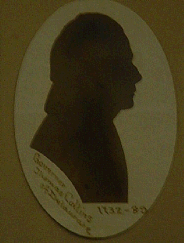 |
Thomas Collins | October 28, 1786 – March 29, 1789 |
5 (1786) [lower-alpha 10] | ||||
| 9 |  |
Jehu Davis | March 29, 1789 – June 2, 1789 | |||||
| 10 | 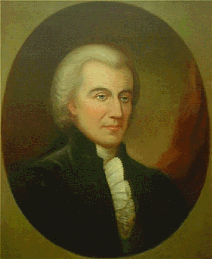 |
Joshua Clayton | June 2, 1789 – January 19, 1796 |
Federalist | 6 (1789) | |||
| 7 (1792) | ||||||||
| 11 |  |
Gunning Bedford, Sr. | January 19, 1796 – September 30, 1797 |
Federalist | 8 (1795) [lower-alpha 11] | |||
| 12 |  |
Daniel Rogers | September 30, 1797 – January 9, 1799 |
Federalist | ||||
| 13 | 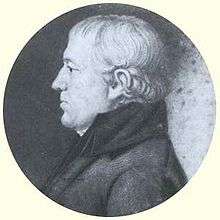 |
Richard Bassett | January 9, 1799 – March 3, 1801 |
Federalist | 9 (1798) [lower-alpha 12] | |||
| 14 |  |
James Sykes | March 3, 1801 – January 19, 1802 |
Federalist | ||||
| 15 |  |
David Hall | January 19, 1802 – January 15, 1805 |
Democratic-Republican | 10 (1801) | |||
| 16 |  |
Nathaniel Mitchell | January 15, 1805 – January 19, 1808 |
Federalist | 11 (1804) | |||
| 17 |  |
George Truitt | January 19, 1808 – January 15, 1811 |
Federalist | 12 (1807) | |||
| 18 |  |
Joseph Haslet | January 15, 1811 – January 18, 1814 |
Democratic-Republican | 13 (1810) | |||
| 19 | 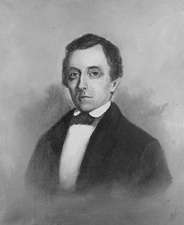 |
Daniel Rodney | January 18, 1814 – January 21, 1817 |
Federalist | 14 (1813) | |||
| 20 |  |
John Clark | January 21, 1817 – January 18, 1820 |
Federalist | 15 (1816) | |||
| — |  |
Henry Molleston | – | Federalist | 16 (1819) [lower-alpha 13] | |||
| 21 |  |
Jacob Stout | January 18, 1820 – January 16, 1821 |
Federalist | ||||
| 22 |  |
John Collins | January 16, 1821 – April 16, 1822 |
Democratic-Republican | ||||
| 23 |  |
Caleb Rodney | April 23, 1822 – January 21, 1823 |
Federalist | ||||
| 24 |  |
Joseph Haslet | January 21, 1823 – June 20, 1823 |
Democratic-Republican | 17 (1822) [lower-alpha 14] | |||
| 25 |  |
Charles Thomas | June 23, 1823 – January 20, 1824 |
Democratic-Republican | ||||
| 26 | 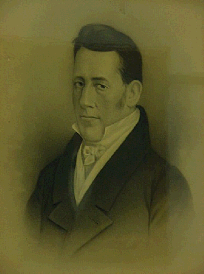 |
Samuel Paynter | January 20, 1824 – January 16, 1827 |
Federalist | 18 (1823) | |||
| 27 | 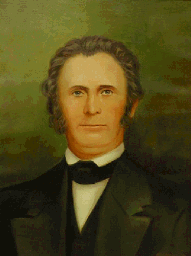 |
Charles Polk, Jr. | January 16, 1827 – January 19, 1830 |
Federalist | 19 (1826) | |||
| 28 |  |
David Hazzard | January 19, 1830 – January 15, 1833 |
National Republican | 20 (1829) | |||
| 29 | 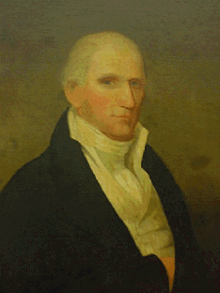 |
Caleb P. Bennett | January 15, 1833 – July 11, 1836 |
Democratic | 21 (1832) [lower-alpha 15][lower-alpha 16] | |||
| 30 |  |
Charles Polk, Jr. | July 11, 1836 – January 17, 1837 |
Whig | ||||
| 31 | 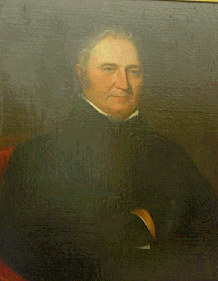 |
Cornelius P. Comegys | January 17, 1837 – January 19, 1841 |
Whig | 22 (1836) | |||
| 32 |  |
William B. Cooper | January 19, 1841 – January 21, 1845 |
Whig | 23 (1840) | |||
| 33 |  |
Thomas Stockton | January 21, 1845 – March 2, 1846 |
Whig | 24 (1844) [lower-alpha 17] | |||
| 34 | 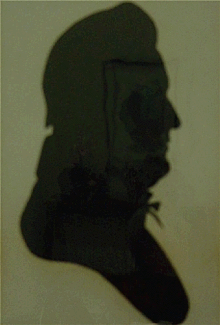 |
Joseph Maull | March 2, 1846 – May 3, 1846 |
Whig | ||||
| 35 |  |
William Temple | May 6, 1846 – January 19, 1847 |
Whig | ||||
| 36 | 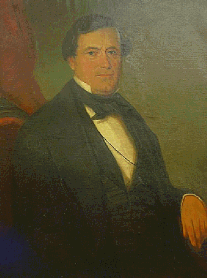 |
William Tharp | January 19, 1847 – January 21, 1851 |
Democratic | 25 (1846) | |||
| 37 |  |
William H. H. Ross | January 21, 1851 – January 16, 1855 |
Democratic | 26 (1850) | |||
| 38 | 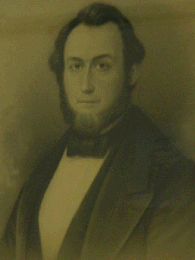 |
Peter F. Causey | January 16, 1855 – January 18, 1859 |
American | 27 (1854) | |||
| 39 | .jpg) |
William Burton | January 18, 1859 – January 20, 1863 |
Democratic | 28 (1858) | |||
| 40 | 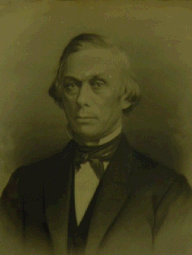 |
William Cannon | January 20, 1863 – March 1, 1865 |
Republican | 29 (1862) [lower-alpha 18] | |||
| 41 |  |
Gove Saulsbury | March 1, 1865 – January 17, 1871 |
Democratic | ||||
| 30 (1866) | ||||||||
| 42 |  |
James Ponder | January 17, 1871 – January 19, 1875 |
Democratic | 31 (1870) | |||
| 43 | 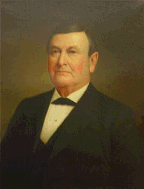 |
John P. Cochran | January 19, 1875 – January 21, 1879 |
Democratic | 32 (1874) | |||
| 44 |  |
John W. Hall | January 21, 1879 – January 16, 1883 |
Democratic | 33 (1878) | |||
| 45 | 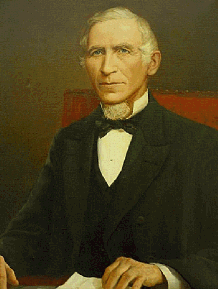 |
Charles C. Stockley | January 16, 1883 – January 18, 1887 |
Democratic | 34 (1882) | |||
| 46 | 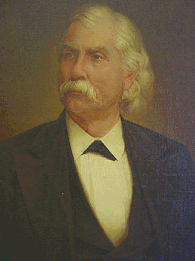 |
Benjamin T. Biggs | January 18, 1887 – January 20, 1891 |
Democratic | 35 (1886) | |||
| 47 |  |
Robert J. Reynolds | January 20, 1891 – January 15, 1895 |
Democratic | 36 (1890) | |||
| 48 |  |
Joshua H. Marvil | January 15, 1895 – April 8, 1895 |
Republican | 37 (1894) [lower-alpha 19] | |||
| 49 | 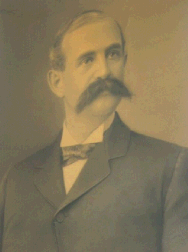 |
William T. Watson | April 8, 1895 – January 19, 1897 |
Democratic | ||||
| 50 | 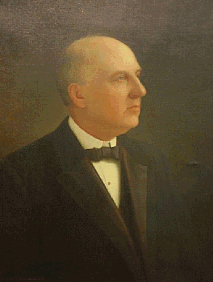 |
Ebe W. Tunnell | January 19, 1897 – January 15, 1901 |
Democratic | 38 (1896) | |||
| 51 | 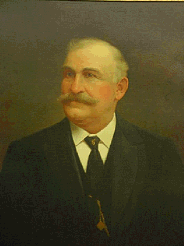 |
John Hunn | January 15, 1901 – January 17, 1905 |
Republican | 39 (1900) |
Philip L. Cannon | ||
| 52 |  |
Preston Lea | January 17, 1905 – January 19, 1909 |
Republican | 40 (1904) |
Isaac T. Parker | ||
| 53 | 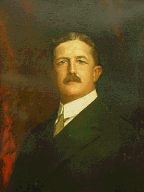 |
Simeon S. Pennewill | January 19, 1909 – January 21, 1913 |
Republican | 41 (1908) |
John M. Mendinhall | ||
| 54 | 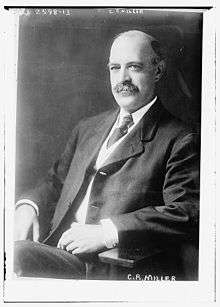 |
Charles R. Miller | January 21, 1913 – January 16, 1917 |
Republican | 42 (1912) |
Colen Ferguson[lower-alpha 20] | ||
| 55 | 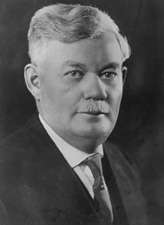 |
John G. Townsend, Jr. | January 16, 1917 – January 18, 1921 |
Republican | 43 (1916) |
Lewis T. Eliason[lower-alpha 20] | ||
| 56 |  |
William D. Denney | January 18, 1921 – January 20, 1925 |
Republican | 44 (1920) |
J. Danforth Bush | ||
| 57 |  |
Robert P. Robinson | January 20, 1925 – January 15, 1929 |
Republican | 45 (1924) |
James H. Anderson | ||
| 58 | 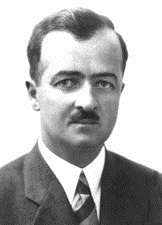 |
C. Douglass Buck | January 15, 1929 – January 19, 1937 |
Republican | 46 (1928) |
James H. Hazel | ||
| 47 (1932) |
Roy F. Corley | |||||||
| 59 |  |
Richard C. McMullen | January 19, 1937 – January 21, 1941 |
Democratic | 48 (1936) |
Edward W. Cooch | ||
| 60 |  |
Walter W. Bacon | January 21, 1941 – January 18, 1949 |
Republican | 49 (1940) |
Isaac J. MacCollum[lower-alpha 20] | ||
| 50 (1944) |
Elbert N. Carvel[lower-alpha 20] | |||||||
| 61 |  |
Elbert N. Carvel | January 18, 1949 – January 20, 1953 |
Democratic | 51 (1948) |
Alexis I. du Pont Bayard | ||
| 62 |  |
J. Caleb Boggs | January 20, 1953 – December 30, 1960 |
Republican | 52 (1952) |
John W. Rollins | ||
| 53 (1956) [lower-alpha 21] |
David P. Buckson | |||||||
| 63 | 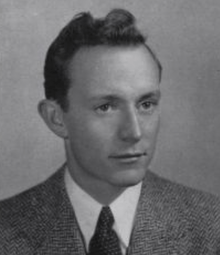 |
David P. Buckson | December 30, 1960 – January 17, 1961 |
Republican | Vacant | |||
| 64 |  |
Elbert N. Carvel | January 17, 1961 – January 19, 1965 |
Democratic | 54 (1960) |
Eugene Lammot | ||
| 65 |  |
Charles L. Terry, Jr. | January 19, 1965 – January 21, 1969 |
Democratic | 55 (1964) |
Sherman W. Tribbitt | ||
| 66 |  |
Russell W. Peterson | January 21, 1969 – January 16, 1973 |
Republican | 56 (1968) |
Eugene Bookhammer[lower-alpha 22] | ||
| 67 |  |
Sherman W. Tribbitt | January 16, 1973 – January 18, 1977 |
Democratic | 57 (1972) | |||
| 68 | 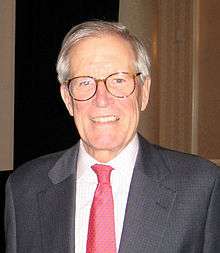 |
Pierre S. du Pont, IV | January 18, 1977 – January 15, 1985 |
Republican | 58 (1976) |
James D. McGinnis[lower-alpha 20] | ||
| 59 (1980) |
Michael Castle | |||||||
| 69 | 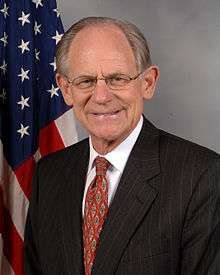 |
Michael Castle | January 15, 1985 – December 31, 1992 |
Republican | 60 (1984) |
Shien Biau Woo[lower-alpha 20] | ||
| 61 (1988) [lower-alpha 23] |
Dale E. Wolf | |||||||
| 70 |  |
Dale E. Wolf | December 31, 1992 – January 19, 1993 |
Republican | Vacant | |||
| 71 | 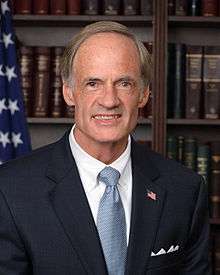 |
Thomas R. Carper | January 19, 1993 – January 3, 2001 |
Democratic | 62 (1992) |
Ruth Ann Minner | ||
| 63 (1996) [lower-alpha 24] | ||||||||
| 72 |  |
Ruth Ann Minner | January 3, 2001 – January 20, 2009 |
Democratic | Vacant | |||
| 64 (2000) |
John Carney | |||||||
| 65 (2004) | ||||||||
| 73 | 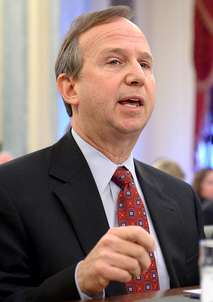 |
Jack Markell | January 20, 2009 – January 17, 2017 |
Democratic | 66 (2008) |
Matt Denn | ||
| 67 (2012) [lower-alpha 25] | ||||||||
| Vacant | ||||||||
| 74 |  |
John Carney Elect |
January 17, 2017 | Democratic | 68 (2016) |
Bethany Hall-Long | ||
Other high offices held
Seventeen of Delaware's governors have held other high offices, with six representing Delaware in the Continental Congress and twelve representing the state in the U.S. Congress. Two have served as President of Pennsylvania. Four (marked with *) resigned to take other offices, three in the U.S. Congress and one to be President of Pennsylvania.
All representatives and senators listed represented Delaware except where noted.
| Governor | Gubernatorial term | Other offices held | Source |
|---|---|---|---|
| McKean, ThomasThomas McKean | 1777 | Continental Delegate (including President of the Continental Congress), President of Pennsylvania | [21] |
| Read, GeorgeGeorge Read | 1777–1778 | Continental Delegate, Senator | [22] |
| Rodney, CaesarCaesar Rodney | 1778–1781 | Continental Delegate | [23] |
| Dickinson, JohnJohn Dickinson | 1781–1783 | Continental Delegate, Continental Delegate from Pennsylvania, President of Pennsylvania* | [24] |
| Van Dyke, NicholasNicholas Van Dyke | 1783–1786 | Continental Delegate | [25] |
| Clayton, JoshuaJoshua Clayton | 1789–1796 | Senator | [26] |
| Bassett, RichardRichard Bassett | 1799–1801 | Senator | [27] |
| Mitchell, NathanielNathaniel Mitchell | 1805–1808 | Continental Delegate | [28] |
| Rodney, DanielDaniel Rodney | 1814–1817 | Representative, Senator | [29] |
| Temple, WilliamWilliam Temple | 1846–1847 | Representative | [30] |
| Biggs, Benjamin T.Benjamin T. Biggs | 1887–1891 | Representative | [31] |
| Townsend, Jr., John G.John G. Townsend, Jr. | 1917–1921 | Senator | [32] |
| Buck, C. DouglassC. Douglass Buck | 1929–1937 | Senator | [33] |
| Boggs, J. CalebJ. Caleb Boggs | 1953–1960 | Senator* | [34] |
| du Pont, IV, Pierre S.Pierre S. du Pont, IV | 1977–1985 | Representative | [35] |
| Castle, MichaelMichael Castle | 1985–1992 | Representative* | [36] |
| Carper, TomTom Carper | 1993–2001 | Representative, Senator* | [37] |
Living former U.S. governors of Delaware
As of May 2015, there are six former U.S. governors who are currently living at this time, the oldest being David P. Buckson (served 1960–1961, born 1920). The most recent death of a former U.S. governor of Delaware was that of Russell W. Peterson (served 1969–1973, born 1916), who died on February 20, 2011. The most recently serving U.S. governor of Delaware to die was Sherman W. Tribbitt (served 1973–1977, born 1922), who died on August 14, 2010.
| Governor | Gubernatorial term | Date of birth (and age) |
|---|---|---|
| David P. Buckson | 1960–1961 | July 25, 1920 |
| Pierre S. du Pont, IV | 1977–1985 | January 22, 1935 |
| Michael Castle | 1985–1992 | July 2, 1939 |
| Dale E. Wolf | 1992–1993 | September 6, 1924 |
| Tom Carper | 1993–2001 | January 23, 1947 |
| Ruth Ann Minner | 2001–2009 | January 17, 1935 |
See also
Notes
- 1 2 3 Includes one term served by a repeat governor.
- ↑ Includes one term served by a repeat governor. Henry Molleston, having never taken office, is not included in this number.
- ↑ The official numbering includes repeat and acting governors.
- ↑ The highest office of Delaware was named president until 1792.
- ↑ Each term for which a governor is elected is listed here; if multiple governors served in a single term, due to resignations, deaths, and the like, then that term will be shared among those governors. If a governor was elected multiple times, then there will be multiple terms listed for that governor.
- ↑ The office of lieutenant governor was created in the 1897 constitution, with the first election taking place in 1900.
- ↑ Lieutenant governors were members of the same party as the governor except where noted.
- ↑ McKinly was captured and taken prisoner by British forces.[12] He was exchanged for loyalist Governor William Franklin of New Jersey in August 1778.[13] Most sources do not specify the day McKinly was captured; at least one specifies that McKinly and the city of Wilmington were captured the day after the Battle of Brandywine, which was on September 11, 1777.[14] As Speaker of the Assembly, McKean acted as chief executive until the return of Speaker of the Legislative Council Read from the Continental Congress in Philadelphia, who then served as vice-president for the remainder of the term.[15]
- ↑ Dickinson was elected President of Pennsylvania and took office November 7, 1782, holding both presidencies simultaneously. Criticism of this caused him to turn administration of the state over to Speaker of the Legislative Council Cook, but Dickinson didn't formally resign until January 12, 1783, whereupon Cook served as vice-president until a special election was held.[16]
- ↑ Collins died in office; as speaker of the legislative council, Davis served as vice-president for the remainder of the term.
- ↑ Bedford died in office; as speaker of the senate, Rogers acted as governor for the remainder of the term.
- ↑ Bassett resigned to take a seat on the United States Third Circuit Court. As speaker of the senate, Sykes acted as governor for the remainder of the term.
- ↑ Governor-elect Molleston died on November 11, 1819, before taking office. The newly elected state senate chose a speaker, Stout, who would act as governor for one year of Molleston's term before a special election was held to pick a governor for the remaining two years.[17] Collins was chosen in that special election, but died in office, and as speaker of the senate, Rodney acted as governor for the remainder of the term.
- ↑ Haslet died in office; as speaker of the senate, Thomas acted as governor until a special election was held. There is disagreement over when Haslet died and Thomas became acting governor. Most modern sources say Haslet died on June 20, and Thomas became acting governor on June 23; however, some sources say Thomas became acting governor on June 20,[18] and others say Haslet died on June 23,[19] both situations meaning there was no gap in power. Because of the death of Haslet so early in his term, early elections were called. Unlike when elections were called due to Henry Molleston's death, where the election was only for the final two years of his term, in this case the new election was for a new three-year term, causing the election schedule to shift.[17]
- ↑ Bennett died in office; As speaker of the senate, Polk acted as governor for the remainder of the term.
- ↑ This term was the first under the terms of the 1831 constitution, which lengthened terms to four years.
- ↑ Stockton died in office. As speaker of the senate, Maull acted as governor until he too died. The new speaker of the senate, Temple, acted as governor for the remainder of the term, which was shortened due to a new election schedule.
- ↑ Cannon died in office; as speaker of the senate, Saulsbury acted as governor for the remainder of the term.
- ↑ Marvil died in office; as speaker of the senate, Watson acted as governor for the remainder of the term. Because Marvil died so early in his term, the General Assembly decided to conduct an election for a full term in 1896, changing the election schedule.[20]
- 1 2 3 4 5 6 Represented the Democratic Party.
- ↑ Boggs resigned to take an elected seat in the United States Senate; as lieutenant governor, Buckson became governor.
- ↑ Represented the Republican Party.
- ↑ Castle resigned to take an elected seat in the United States House of Representatives; as lieutenant governor, Wolf become governor.
- ↑ Carper resigned to take an elected seat in the United States Senate; as lieutenant governor, Minner became governor.
- ↑ Governor Markell's second term expires on January 17, 2017; he will be term limited.
References
- General
- Martin, Roger A. (1984). A History of Delaware Through its Governors. Wilmington, Delaware: McClafferty Press.
- "Delaware: Past Governors Bios". National Governors Association. Retrieved August 29, 2016.
- Thorpe, Francis Newton (1906). The Federal and State Constitutions, Colonial Charters, and Other Organic Laws of the States, Territories, and Colonies Now or Heretofore Forming the United States of America. Government Printing Office. pp. 568–600. ISBN 0-89941-792-2. Retrieved October 26, 2009.
- Pickett, Russell S. "Delaware Governors". Retrieved October 25, 2009.
- Constitutions
- "Constitution of the State of Delaware". State of Delaware. 1897. Retrieved June 10, 2009.
- Constitution of the State of Delaware (1831)[38]
- Constitution of the State of Delaware (1792)[39]
- "Constitution of the State of Delaware". Avalon Project. Yale Law School. 1776. Retrieved June 10, 2009.
- Specific
- ↑ "CSG Releases 2013 Governor Salaries". The Council of State Governments. June 25, 2013. Retrieved November 23, 2014.
- ↑ DE Const. art. III
- ↑ DE Const. art. VII, § 1
- ↑ 1776 Const. art 7
- ↑ 1792 Const. art. III, § 1
- ↑ 1792 Const. art. III, § 3
- ↑ 1831 Const. art III, § 3
- ↑ DE Const. art. III, § 5
- ↑ 1776 Const. art. 7
- ↑ DE Const. art. III, § 19
- ↑ DE Const. art. III, § 20
- ↑ McGuire, Thomas J. (2006). The Philadelphia Campaign. Mechanicsburg, Pennsylvania: Stackpole Books. p. 278. ISBN 0-8117-0206-5.
- ↑ Rowe, Gail Stuart (1978). Thomas McKean: The Shaping of an American Republicanism. p. 147. ISBN 0-87081-100-2.
- ↑ Project, Delaware Federal Writers' (1938). Delaware: A Guide to the First State. p. 48. ISBN 978-1-60354-008-7. Retrieved August 4, 2010.
- ↑ Conrad, Henry Clay (1908). History of the State of Delaware, Volume 3. p. 821. Retrieved October 25, 2009.
- ↑ Conrad, Henry Clay. History of the State of Delaware, Volume 1. p. 153. Retrieved August 26, 2016.
- 1 2 Niles, H. (1824). Niles' Weekly Register. Volume I, Third Series. p. 121. ISBN 0-8371-3045-X. Retrieved October 25, 2009.
- ↑ "Delaware". The Encyclopedia Americana. Volume. VIII. 1918. p. 614. Retrieved October 25, 2009.
- ↑ Messersmith, George S. (1908). Government of Delaware. p. 283. Retrieved October 25, 2009.
- ↑ "Delaware's Change in Elections". The New York Times. April 14, 1895. Retrieved October 25, 2009.
- ↑ "McKean, Thomas". Biographical Directory of the United States Congress. Clerk of the United States House of Representatives and Historian of the United States Senate. Retrieved June 12, 2009.
- ↑ "Read, George". Biographical Directory of the United States Congress. Clerk of the United States House of Representatives and Historian of the United States Senate. Retrieved June 12, 2009.
- ↑ "Rodney, Caesar". Biographical Directory of the United States Congress. Clerk of the United States House of Representatives and Historian of the United States Senate. Retrieved June 12, 2009.
- ↑ "Dickinson, John". Biographical Directory of the United States Congress. Clerk of the United States House of Representatives and Historian of the United States Senate. Retrieved June 12, 2009.
- ↑ "Van Dyke, Nicholas". Biographical Directory of the United States Congress. Clerk of the United States House of Representatives and Historian of the United States Senate. Retrieved June 12, 2009.
- ↑ "Clayton, Joshua". Biographical Directory of the United States Congress. Clerk of the United States House of Representatives and Historian of the United States Senate. Retrieved June 12, 2009.
- ↑ "Bassett, Richard". Biographical Directory of the United States Congress. Clerk of the United States House of Representatives and Historian of the United States Senate. Retrieved June 12, 2009.
- ↑ "Mitchell, Nathaniel". Biographical Directory of the United States Congress. Clerk of the United States House of Representatives and Historian of the United States Senate. Retrieved June 12, 2009.
- ↑ "Rodney, Daniel". Biographical Directory of the United States Congress. Clerk of the United States House of Representatives and Historian of the United States Senate. Retrieved June 12, 2009.
- ↑ "Temple, William". Biographical Directory of the United States Congress. Clerk of the United States House of Representatives and Historian of the United States Senate. Retrieved June 12, 2009.
- ↑ "Biggs, Benjamin Thomas". Biographical Directory of the United States Congress. Clerk of the United States House of Representatives and Historian of the United States Senate. Retrieved June 12, 2009.
- ↑ "Townsend, John Gillis, Jr.". Biographical Directory of the United States Congress. Clerk of the United States House of Representatives and Historian of the United States Senate. Retrieved June 12, 2009.
- ↑ "Buck, Clayton Douglass". Biographical Directory of the United States Congress. Clerk of the United States House of Representatives and Historian of the United States Senate. Retrieved June 12, 2009.
- ↑ "Boggs, James Caleb". Biographical Directory of the United States Congress. Clerk of the United States House of Representatives and Historian of the United States Senate. Retrieved June 12, 2009.
- ↑ "du Pont, Pierre Samuel, IV". Biographical Directory of the United States Congress. Clerk of the United States House of Representatives and Historian of the United States Senate. Retrieved June 12, 2009.
- ↑ "Castle, Michael Newbold". Biographical Directory of the United States Congress. Clerk of the United States House of Representatives and Historian of the United States Senate. Retrieved June 12, 2009.
- ↑ "Carper, Thomas Richard". Biographical Directory of the United States Congress. Clerk of the United States House of Representatives and Historian of the United States Senate. Retrieved June 12, 2009.
- ↑ Thorpe pp. 582–600
- ↑ Thorpe pp. 568–582
External links
| Wikimedia Commons has media related to Governors of Delaware. |

